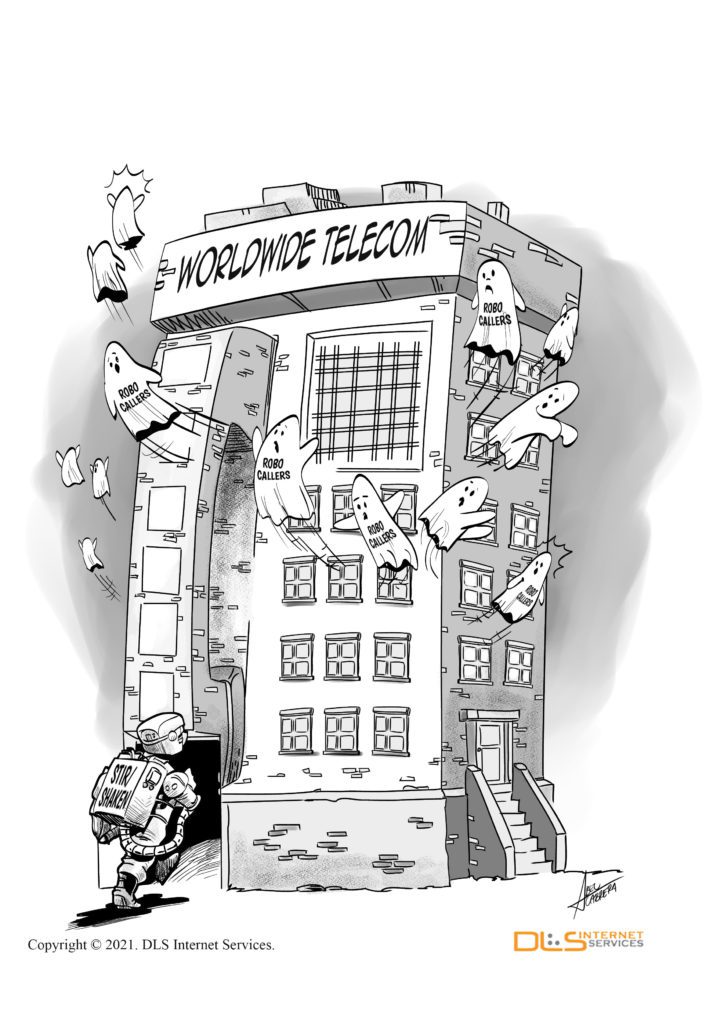
There’s no doubt that the United States is in the grip of a major epidemic of a different kind – robocalls. If you trust the TNS Robocall Investigation Report, Americans received 80 billion robocalls last year! Yet less than 5% of the calls came from the top six US carriers. These figures mean that spammers are mostly using VoIP providers. The FCC had to, finally, step in to deal with Robocalls. It has ruled that all US providers must use STIR/SHAKEN or set up a robocall mitigation program.
What is STIR/SHAKEN?
STIR/SHAKEN is a set of protocols that don’t let anyone use a fake caller-id. It requires that VoIP providers digitally sign each call to verify their origin. Without this digital signature, the sending provider will consider the call “spoofed”. Calls from fake numbers will not be allowed to go through.
As the name implies, STIR/SHAKEN is made of two standards. Short for Secure Telephony Identity Revisited, STIR authenticates the caller ID of calls going through a VoIP network. SHAKEN, or Signature-based Handling of Asserted Information Using Tokens, defines how phone companies exchange digitally signed information. Together, STIR/SHAKEN prove that calling party’s phone number is really theirs.
Unintended Consequences of STIR/SHAKEN
STIR/SHAKEN aims to curb illegal robocalls. It forces businesses to use their own verified numbers. Authorities can identify and trace such calls if they spam or violate any laws.
No good deed… Every great idea may have some unintended results. Let’s look at the following scenarios:
1. Call-Forwarding
Imagine receiving an outside call into your phone system. Your system is set to keep the caller-id when forwarding the call. In the case of STIR/SHAKEN, the phone company of a business forwarding the call does not own the phone number. The signature of originating carrier will not match the id of the carrier forwarding the call. A call will seem “spoofed”. It is not likely that it will go through.
Many legitimate businesses use call forwarding and follow-me features. This is not good news for them. To work around this issue, you will need to make your phone system rewrite the caller id of a forwarded call. The drawback is that you will see that the call comes from your office number. You will not be able to identify the caller.
2. Impact on Call Centers and BPOs
Call centers often place calls from large blocks of phone numbers to hide their identity.
Some small businesses also need to make anonymous calls. STIR/SHAKEN will make it impossible for call centers to use phone-number spoofing the way they have in the past. At best, the recipient will get a message “Scam Likely”. In most cases, however, the call will not connect. STIR/SHAKEN demands from call centers to have a genuine business number that they own. This rule will make it hard for call center agents to hide their phone numbers from call recipients.
There is another possible issue. Robocallers outside the US and Canada may start using international numbers. This way, inbound calls will look like they are coming from some number outside the US.
Of course, some call recipients may have a favorite cousin living abroad. A few may do business internationally. Most of us ignore international calls from some weird unknown number.
3. Porting Phone Numbers
When you port your number from one provider to another, you can use it as your Caller-ID with the new service. Since your port may take weeks, new provider typically assigns you a temporary phone number. While you are using this number, you could forward the old one to it.
STIR/SHAKEN protocol will no longer let you to use the number as your caller-id with the new provider until your new service provider takes possession of it. In the meantime, you’ll have to use a temporary number given to you by your new provider. The problem with using a temporary number is that it is unfamiliar to your customers. They will not recognize a call from an unknown number. Pressure on carriers to speed up the phone number porting will grow.
4. Concern for Privacy
Many industries, such as healthcare, legal, and financial mask numbers. These businesses seek to maintain privacy for a couple of reasons. One must know that it is perfectly legal for a caller not to reveal the phone number. On other hand, not many people will answer a call from a hidden number. Before STIR/SHAKEN, doctors could call from a random number that you cannot call back. Now they can only make outbound calls from the numbers that belong to them. It’s an unintended consequence causing inconvenience in some legitimate scenarios.
Cost of Implementing STIR/SHAKEN
The FCC’s new rule is a good idea, but every good idea has a cost. Each year there are new FCC rules requiring phone providers to make changes to their systems. These changes require investment by VoIP service providers. If you are still wondering about the fees on your phone bills, you have your answer.
Conclusion
STIR/SHAKEN’s goal is to counter spoofing. Security standards aren’t meant to be convenient. The good news is that most carriers and VoIP providers have already adopted it, and smaller players are following. Something had to be done about illegal robocalls. This problem was getting out of hand.
Our service became STIR/SHAKEN compliant with version 5.6 of our Hosted PBX. DLS is committed to rich communication solutions for businesses of all sizes. If you have questions about STIR/SHAKEN or our services, please let us know by contacting our technical support or sales teams.